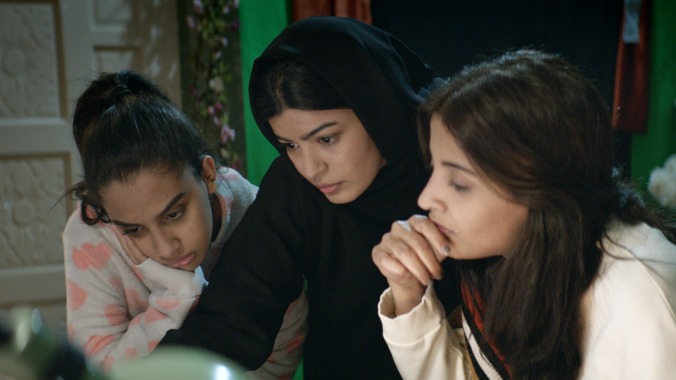The Perfect Candidate Photo: Music Box Films
Note: The writer of this review watched The Perfect Candidate on a digital screener from home. Before making the decision to see it—or any other film—in a movie theater, please consider the health risks involved. Here’s an interview on the matter with scientific experts.
The Perfect Candidate begins and ends with a car. It’s an unremarkable vehicle, the views from it far from exciting: no accidents, no road rage, no noisy pursuit. And director Haifaa Al-Mansour makes no attempt to obscure the mundanity and even the tedium of the daily commute we’re witnessing. Yet to describe these sequences as quietly revolutionary would not be overstatement. Only in 2018 did women in Saudi Arabia gain the right to drive. The dull path Maryam (Mila Al Zahrani) takes to work—formed by a seismic shift, not in the earth but in society—is still a rough one, both literally and figuratively. The inciting incident of Al-Mansour’s warm, determined political fable is a flooded road, and if the metaphor is a little on the nose, its appropriateness is undeniable. Progress, like traffic, moves slowly, but it moves all the same.
Maryam’s grievances aren’t rooted in impatience. A young doctor in an underfunded emergency room, she rightly identifies the muddy road not as an inconvenience but a potentially catastrophic hazard, capable of creating delays in an environment where time and a clear path are the stuff of life and death. Maryam’s pleas to an indifferent local politician go unheard, and seeking employment elsewhere only leads to a less literal impasse. When she finally embarks upon (or more accurately, stumbles into) a campaign for public office, she’s not doing so as a trailblazer or feminist champion. She just wants to fix the road. But as she soon discovers, alongside her sister (Dhay) and grieving father (musician Khalid Abdulrahim), nothing is quite so simple.
Al-Mansour is considered Saudi Arabia’s first female filmmaker. Her first feature, Wadjda, was also the first feature period to be filmed entirely in the country. She ran production from within a van, in order to avoid physically interacting with male members of her crew. Having since made a few films abroad (including a Mary Shelley biopic), Al-Mansour returned home for The Perfect Candidate, stepping outside of the van this time. The energy of that shift in methods—the newfound freedom of it—reverberates through the narrative.
That the threads linking filmmaker to protagonist are clear makes them no less effective. But neither the film nor its heroine show any interest in soaring, Sorkinesque political romanticism. Maryam doesn’t want to be a transformative figure. She just wants the road fixed. Frustration and impatience drive her, not idealism. And yet Al-Mansour doesn’t deny the obvious; when a dismissive TV interviewer suggests that Maryam’s campaign is centered on “women’s issues”—namely that there should be more gardens—Maryam notes with determined calm that yes, women’s issues matter, and yes, she believes their voices should be heard. But she’s running to improve the lives of all her neighbors. And she’s going to start by fixing that road.
There’s a dramatic neatness here more indicative of a parable or fairy tale than an intimate family drama. Add in a swelling, sports-movie score and The Perfect Candidate would sit comfortably on the shelf along other feel-good underdog stories. (Think Rudy, but with municipal elections and lots of oud.) Yet Al-Mansour and her able cast supply a richer texture than such a description might suggest. As Maryam’s bemused, supportive sister, Dhay is particularly effective, imbuing the familial relationships with a sense of history and projecting a maternal energy that underlines the loss the family has recently endured. Al Zahrani’s light touch keeps the film from ever straying too far in the direction of sentimentality (a monumental achievement in some of the film’s final scenes). And Abdulrahim, a folk musician new to acting, largely confines any obvious emotion to the numerous musical scenes, each in its own way as celebratory and monumental as Maryam’s driving.
The films bears the weight of any heavy-handedness precisely because Al-Mansour leaves room for intimacy. Maryam’s sister works as a wedding coordinator, and that links the disparate pieces of the plot, tying music to community to memory to grief to politics to identity, and on and on. What does it cost those around you when you step forward? How does one navigate the pain of progress, or the potential heartbreak of hope? Quietly, stolidly, Al-Mansour and company explore these questions, never hiding the fact that such journeys are never without a few rough patches.
In the end, it becomes clear that The Perfect Candidate, like Maryam herself, is operating from a place of stubborn optimism, not naïveté, and that it definitely doesn’t spring from ignorance. By the time Al-Mansour arrives at her final shot—a composition that’s quietly breathtaking in its simplicity and power—she’s earned nearly every sentimental beat her story hits. The film ends with Maryam back in her car, headed home after another long day. It gives us the only happy ending necessary: the knowledge that tomorrow she’ll climb behind the wheel and get back to work, whatever form that may take.









































